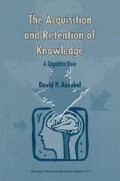Abstract
Classroom or subject-matter learning is primarily concerned with the acquisition, retention, and use of large bodies of meaningful information such as facts, propositions, principles, and vocabulary in the various disciplines. It is important, therefore, that we make very explicit at the outset what we mean by meaning and meaningful learning. The concept of knowledge itself may refer either to the sum total of all organized subject matter and content possessed by an individual in a given field of inquiry or merely to the relative position and specific relationships of particular component elements in the hierarchical structure of the discipline as a whole.
Access this chapter
Tax calculation will be finalised at checkout
Purchases are for personal use only
Preview
Unable to display preview. Download preview PDF.
References
Alberts, C. A., & Ehrenfreund, D. Transposition in children as a function of age.
Ausubel, D. P. Educational psychology: A cognitive view. New York: Holt, Rinehart & Winston, 1968.
Bernard, W. Psychological principles of language learning and the bilingual reading method. Modern Language Journal, 1951, 35, 87–96.
Bjorgen, I. A. Are-evaluation of rote learning. Oslo: Oslo University Press, 1964.
Bower, G. Human memory: Basic processes. New York: Academic Press, 1977.
Brozova, V. Effect of organized learning on text understanding and perceiving. Studia Psychologica, 1995, 37: 259–268.
Carroll, J. B. The analysis of reading instruction: Perspectives from psychology and linguistics. In Theories of learning and instruction. 63rd Yearbook, Nat’l. Soc. Stud. Educ., Part I. Chicago: University of Chicago Press, 1964.
Chomsky, N. A. Language and mind. New York: Harcourt, 1972.
Chomsky, N. A. Syntactic structures. The Hague: Mouton, 1957.
Epstein, W., Rock, I., & Zuckerman, C. B. Meaning and familiarity in associative learning. Psychological Monographs,1960, 74 (Whole No. 491).
Gagné, R. M., & Briggs, L. J. Principles of instructional design. New York: Holt, Rinehart & Winston, 1974.
Glaze, J. A. The association value of nonsense syllables. Journal of Genetic Psychology,1928, 35,255267.
Greeno, J. G. Situations, mental models and generative knowledge. In D. Klahs & K. Hotovsky (Eds.), Complex information processing: The impact of Herbert A. Simon. Mahwah, N.J.: Lawrence Erlbaum Associates, 1989.
Greeno, J. Human memory: Paradigms and paradoxes. Hillsdale, N.J.: Lawrence Erlbaum Associates, 1992.
Hendrix, G. A new clue to transfer of training. Elementary School Journal, 1947, 48, 197–208. Hendrix, G. Learning by discovery. Mathematics Teacher, 1961, 54, 290–299.
Hirt, E. R., McDonald, H. E., & Erikson, G. A. How do I remember thee? The role of encoding, set, and delay in reconstructive memory processes. J. Exp. Soc. Psychol., 1995, 31: 379–409.
Inhelder, B., & Piaget, J. The growth of logical thinking from childhood to adolescence. New York: Basic Books, 1958.
Kendler, H. H., & Kendler, T. S. Effect of verbalization on reversal shifts in children. Science, 1961, 134, 1619–1620.
Kendler, T. S. Development of mediating responses in children. Monographs of the Society for Research in Child Development, 1963, 28, No. E. 33–48.
Lennenberg, E. H. On explaining language: The development of language in children can best be understood in the context of developmental biology. Science, 1969, 164, 635–643.
McNeill, D. The acquisition of language. New York: Harper & Row, 1970.
Miller, G. A. The magical number seven plus or minus two: Some limits in our ability for processing information. Psychological Review, 1956, 63, 81–97.
Miller, G. A., & Selfridge, J. A. Verbal context and the recall of meaningful material. American Journal of Psychology, 1950, 63, 176–185.
Moreno, V., & Vesta, F. J. Analogies (adages) as aids for comprehending structural relations in text. Contemporary Educational Psychology, 1994, 19, 179–198.
Neisser, U. Psychology of cognition. New York: Appleton-Century-Crofts, 1970.
Noble, E. E. The familiarity-frequency relationship. Psychological Review, 1953, 60, 80–98.
Norman, D. Memory and attention. New York: Wiley, 1968.
Rosch, E. On the internal structure of perceptual and semantic categories. In T. E. Moore (Ed.), Cognitive development and the acquisition of language. New York: Academic Press, 1973.
Shavelson, R. G. Some aspects of the correspondence between content structures and cognitive structures in physics instruction. Journal of Educational Psychology, 1972, 225–234.
Spiker, C. C., & Terrell, G. Factors associated with transposition behavior of preschool children. Journal of Genetic Psychology, 1955, 86, 143–158.
Underwood, B. J., & Schulz, R. W. Meaningfulness and verbal learning. Philadelphia: Lippincott, 1960. Vygotsky, L. S. Thought and language. New York: Wiley, 1962.
Weir, M. W., & Stevenson, H. W. The effect of verbalization in children’s learning as a function of chronological age. Child Development, 1959, 30, 143–149.
Whorf, B. L. Language thought and reality: Selected writings of Benjamin Lee Whorf. Cambridge, Mass.: Massachusetts Institute of Technology Press, 1956.
Author information
Authors and Affiliations
Rights and permissions
Copyright information
© 2000 Springer Science+Business Media Dordrecht
About this chapter
Cite this chapter
Ausubel, D.P. (2000). The Nature of Meaning and Meaningful Learning. In: The Acquisition and Retention of Knowledge: A Cognitive View. Springer, Dordrecht. https://doi.org/10.1007/978-94-015-9454-7_4
Download citation
DOI: https://doi.org/10.1007/978-94-015-9454-7_4
Publisher Name: Springer, Dordrecht
Print ISBN: 978-90-481-5536-1
Online ISBN: 978-94-015-9454-7
eBook Packages: Springer Book Archive

